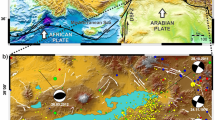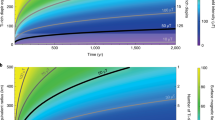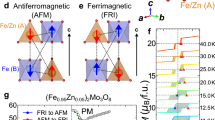Abstract
IN a previous article1, one of us (T. N.) reported the phenomenon of self-reversal of the thermo-remanent magnetization of the ejecta of Mt. Haruna and of the ferromagnetic minerals separated from the rocks. It was also proved experimentally that the characteristics of the reverse thermo-remanent magnetization of the ferromagnetic minerals are the same as those of reverse thermo-remanent magnetism of their mother rocks.
This is a preview of subscription content, access via your institution
Access options
Subscribe to this journal
Receive 51 print issues and online access
$199.00 per year
only $3.90 per issue
Buy this article
- Purchase on Springer Link
- Instant access to full article PDF
Prices may be subject to local taxes which are calculated during checkout
Similar content being viewed by others
References
Nagata, T., Nature, 169, 704 (1952).
Néel, L., Ann. Géophys., 7, 90 (1951).
Nagata, T., Uyeda, S., and Akimoto, S., J. Geomag. Geoelect., 4, 22 (1952). Néel, L., C.R. Acad. Sci., Paris, 234, 1991 (1952).
Matuyama, M., Proc. Imp. Acad. Japan, 5, 203 (1929).
Author information
Authors and Affiliations
Rights and permissions
About this article
Cite this article
NAGATA, T., AKIMOTO, S. & UYEDA, S. Origin of Reverse Thermo-remanent Magnetism of Igneous Rocks. Nature 172, 630–631 (1953). https://doi.org/10.1038/172630a0
Issue Date:
DOI: https://doi.org/10.1038/172630a0
This article is cited by
-
Emergence of ferromagnetism due to charge transfer in compressed ilmenite powder using super-high-energy ball milling
Scientific Reports (2020)
-
Exchange Interaction as a Cause of Reverse Thermo-Remanent Magnetism
Nature (1959)
-
Magnetic properties of ferromagnetic ilmenites
Geofisica Pura e Applicata (1956)
-
Self-Reversal of Thermo-Remanent Magnetization of Igneous Rocks
Nature (1953)
Comments
By submitting a comment you agree to abide by our Terms and Community Guidelines. If you find something abusive or that does not comply with our terms or guidelines please flag it as inappropriate.



